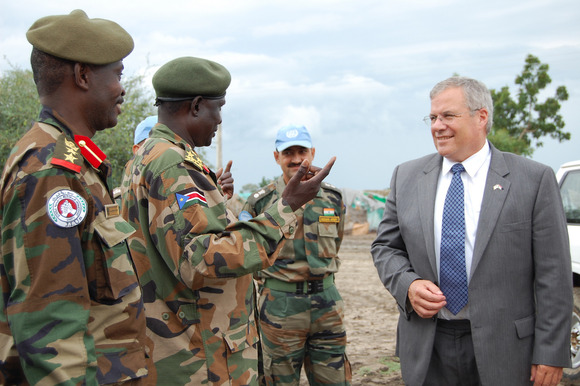Sudan’s oil-rich Kordofan region has become the latest focal point in the ongoing war between the Sudanese army and the Rapid Support Forces (RSF), as both sides fight for dominance in a conflict that has torn the country apart for over two years.
The spotlight has shifted to this strategically vital region following recent attacks that left hundreds of civilians dead. The renewed focus underscores Kordofan’s pivotal role in the war.
“Whoever controls Kordofan effectively controls the country’s oil supply, as well as a huge chunk of Sudan,” said Amir Amin, an analyst with Oasis Policy Advisory, in an interview with the BBC.
The region’s significance extends beyond Sudan’s borders. Landlocked South Sudan’s oil exports are heavily dependent on pipelines that run through Kordofan, making the region’s stability a matter of national interest for its southern neighbor.
Kordofan, composed of three states and home to nearly eight million people, has seen fierce fighting since June. The army, after suffering losses to the RSF earlier this year, launched a renewed offensive to retake key territory. In the months prior, the RSF had made gains across several fronts, including reclaiming the capital Khartoum and Gezira state, Sudan’s agricultural heartland. On July 20, military leader Gen Abdel Fattah al-Burhan made a rare appearance at Khartoum’s main airport—his second visit since March when the army ousted RSF fighters from the capital.
Despite the army’s partial success, Gen Burhan continues to operate out of the eastern city of Port Sudan. His absence from Khartoum is widely seen as a sign that the city, largely destroyed by war, is still too unstable for a permanent return. The broader conflict has already resulted in approximately 150,000 deaths and displaced nearly 12 million people—equivalent to the population of Belgium or Tunisia.
The RSF seized Khartoum shortly after the conflict began in April 2023, following a dramatic breakdown in relations between Gen Burhan and RSF leader Gen Mohamed Hamdan Dagalo, commonly known as “Hemedti.” The paramilitary group had previously supported Burhan in the 2021 coup and helped suppress opposition before the two men fell out over plans to merge the RSF into the national army.
Analyst Alan Boswell of the International Crisis Group told the BBC that the army is targeting Kordofan as a launchpad for a broader push into Darfur, a region long considered the RSF’s stronghold. Conversely, the RSF sees capturing Kordofan as a strategic move that would revive its campaign and bring it closer to threatening central Sudan again—including a possible return to Khartoum.
However, many observers doubt the army’s ability to retake control of the region. Dr Suliman Baldo, director of the Sudan Transparency and Policy Tracker, told the BBC that RSF fighters are largely drawn from the Misseriya ethnic group, who live in West Kordofan and will fiercely defend their communities.
Recent army airstrikes in West Kordofan, including attacks on el-Fula (the state capital) and the town of Abu Zabad, have reportedly killed dozens of civilians and fueled resentment among local populations. Dr Baldo warned that the military’s strategy amounts to “collective punishment” against communities seen as sympathetic to the RSF.
Although the military still controls the region’s oil fields, the RSF has threatened to expand its attacks toward the oil-rich Heglig area in South Kordofan if airstrikes persist. “If the army’s aviation returns again and bombs citizens in West Kordofan state, we will strike and shut down Heglig’s oil and kill the engineers,” said Youssef Awadallah Aliyan, head of the RSF’s civilian administration in West Kordofan, in remarks reported by the Sudan Tribune.
The United Nations Office for the Coordination of Humanitarian Affairs (Ocha) condemned the army’s strikes on civilian infrastructure, including a school used as a shelter, which killed more than 20 people. Ocha reiterated that attacks on civilians and non-military buildings are violations of international humanitarian law.
The RSF, too, stands accused of committing atrocities. The UN children’s agency, Unicef, said over 450 civilians were killed in recent RSF-led attacks in North Kordofan, including in the villages of Shag Alnom and Hilat Hamid. Victims included children and pregnant women.
“These attacks are an outrage,” Unicef said in a statement, describing them as a horrifying escalation and a stark display of disregard for human life. The Yale Humanitarian Research Lab analyzed satellite imagery from Shag Alnom and concluded the area had likely been subjected to intentional arson attacks.
Emergency Lawyers, a Sudanese human rights group, said many of the over 200 victims were either burned alive in their homes or shot. Civilian casualties are expected to rise further amid growing fears of an RSF offensive to capture el-Obeid, the capital of North Kordofan.
The nearby town of Umm Sumaima has changed hands multiple times recently and is seen as a critical defensive point. “It is the last defence post for the Sudan Armed Forces before el-Obeid,” said Dr Baldo.
Control of Umm Sumaima could allow the RSF to surround the army’s el-Obeid base, while the military seeks to secure the town as part of a broader supply corridor to resupply troops elsewhere in Kordofan.
Spanning around 390,000 square kilometers (150,000 square miles), Kordofan’s strategic and symbolic importance means the fight for the region will likely be drawn-out and brutal.
“Whether or not it will decide the victor of the war is up for debate, but it definitely will be a seismic shift,” Mr Amin concluded.






